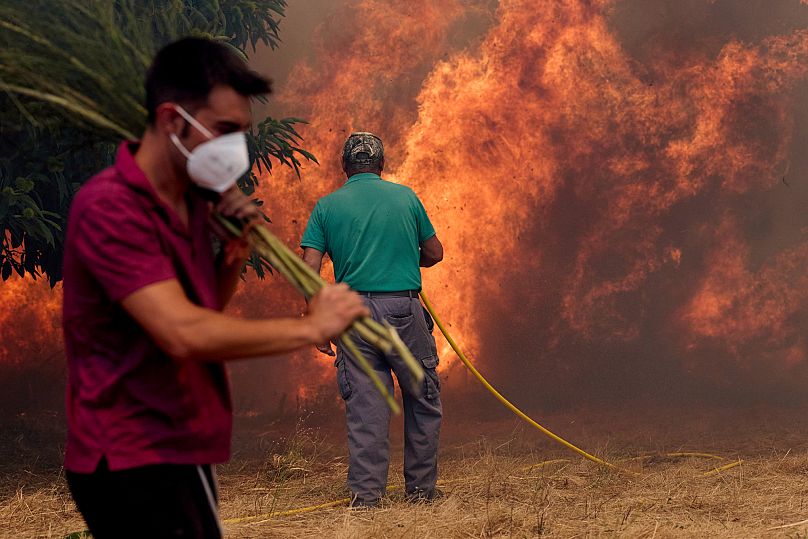Europe Engulfed: Wildfires Ravage Greece and Spain, Sparking Urgent EU Solidarity Call

The European solidarity mechanism for tackling wildfires has seen an unprecedented surge in requests this year, with the number of activations by mid-August matching the total tally for the entire 2024 fire season. European Commission spokesperson Eva Hrncirova confirmed that the mechanism has been activated 16 times during the current season, an amount equal to the total activations from the previous summer. This highlights a significantly more active and challenging wildfire season across Europe and surrounding regions.
Spain recently made its first-ever request for European solidarity against wildfires, becoming the latest country to seek assistance. Tragically, at least three people, including a volunteer firefighter, have died as wildfires ravaged the north-western León province. In response, two planes from the rescEU strategic reserve, currently stationed in France, were deployed to Spain. This week alone, Bulgaria, Montenegro, Albania, and Greece also sought assistance, while Israel and Syria have additionally requested support.
The EU Civil Protection Mechanism facilitates this international cooperation. When a country requires assistance, it informs the EU's Emergency Response Coordination Centre (ERCC) of its needs. Other participating states can then individually volunteer equipment and manpower. The ERCC subsequently coordinates the deployment of these contributions, with the European Union covering the costs. This mechanism proves particularly crucial for smaller countries, as noted by Hrncirova, frequently assisting nations in the Western Balkans like Albania, Montenegro, and North Macedonia, which have also activated the mechanism for wildfires this year, alongside Cyprus and Bosnia and Herzegovina.
To proactively combat the threat, Spain and Greece, traditionally highly susceptible to wildfires, hosted foreign firefighters pre-positioned on their soil since July. A record 650 firefighters from 14 European countries were pre-deployed in high-risk areas—the highest number since the scheme's inception in 2022. France and Portugal also welcomed these foreign teams. Larger countries, such as France, which recently battled its largest wildfires in decades in Aude, often possess significant internal capacities and have increased them due to the impacts of global warming, thus not always requiring external European assistance.
The scale of the current fire season is alarming. According to the European Forest Fire Information System (EFFIS), over 511,000 hectares across the EU had been incinerated by August 12, more than double the average for the same period between 2006 and 2024. The number of fires observed since the start of the year has exceeded 1,600, a significant jump from the 20-year average of 717 by the same date.
In Spain, amidst the widespread devastation where over 391,000 hectares have burned this year, recent humid weather and rainfall have offered a crucial reprieve, aiding authorities in their fight. While 40 fires remain active, improved weather, particularly in León province, is helping firefighters gain control, enabling a reallocation of resources to other affected areas. Alfonso Fernández Mañueco, president of the Castile and León region, reported favorable progress and unveiled an aid plan for those impacted, offering €500 for evacuees and up to €185,000 for homes lost.
International support has been vital, with German firefighting units arriving in northern Spain to assist with blazes, including a significant one in Jarilla, Extremadura. Beyond immediate suppression efforts, factors contributing to the intensity of fires are being examined. In Galicia, for instance, poor land management, including unmanaged vegetation and depopulated villages in forested areas, has led to a dangerous buildup of wildfire fuel. Human activity is also a considerable concern, with police detaining 37 individuals for suspected arson and investigating 89 others.
The crisis extends beyond Spain. In neighboring Portugal, over 3,700 firefighters were battling blazes that have consumed approximately 235,000 hectares—nearly five times the 2006-2024 average for this period—and claimed two lives. The environmental consequences are far-reaching; air quality across large parts of Spain deteriorated, and smoke from the Iberian Peninsula fires reached as far as France, the UK, and Scandinavia, as reported by the EU’s Copernicus climate monitoring agency.
These escalating wildfire events are inextricably linked to climate change. Europe has been warming at twice the global average rate since the 1980s, according to Copernicus. Scientists confirm that climate change intensifies the frequency and severity of heatwaves and dry conditions across parts of Europe, rendering the region increasingly susceptible to devastating wildfires.
You may also like...
The Day Nigeria Fell in Love With Fuel Scarcity

How Nigeria turned fuel scarcity into a strange national tradition of endurance, humour, and survival. A satirical yet s...
Terraforming Mars: Dream, Delusion, or the Next Frontier?

Can we really turn Mars into a second Earth, or are we chasing a dangerous dream while neglecting our own planet? It’s t...
When Love Letters Were Real: Before Relationships Became Content

Before likes and DMs defined affection, love in Africa was handwritten, raw, and real. This piece revisits the lost art ...
Rangers Eye Steven Gerrard for Managerial Return Following Russell Martin Exit

Steven Gerrard is the leading candidate to replace Russell Martin as Rangers manager, with reports suggesting the club i...
Ray Winstone Reveals Epic Drunken Star Wars Audition Fail

Ray Winstone shares a candid account of his disastrous “Star Wars” audition for Padmé Amidala's father, admitting he was...
Hollywood Icon Nancylee Myatt, TV Creator, Dies at 68

Nancylee Myatt, an Emmy-winning television writer and producer known for creating NBC's "Social Studies" and her work on...
Zach Bryan Ignites Firestorm: Artist Defends 'Misconstrued' ICE Song Amidst Public Outcry

Zach Bryan clarified the controversy surrounding a recent song snippet, asserting his lyrics about police and ICE were "...
SEVENTEEN Duo Unlocks 'HYPE VIBES': S.Coups & Mingyu Reveal Their Most Authentic Album Yet

K-pop powerhouse SEVENTEEN continues to expand its musical horizons with the debut of its new unit, CxM, featuring S.Cou...